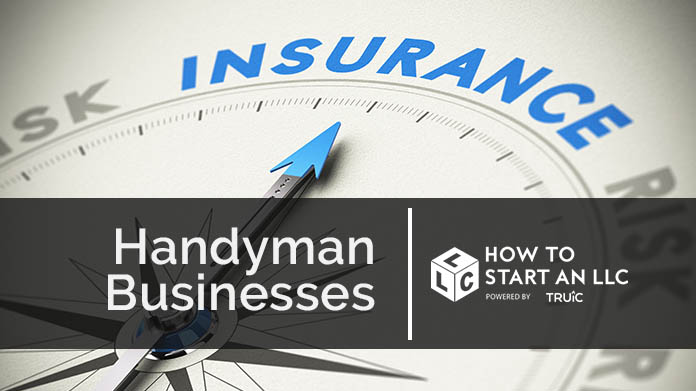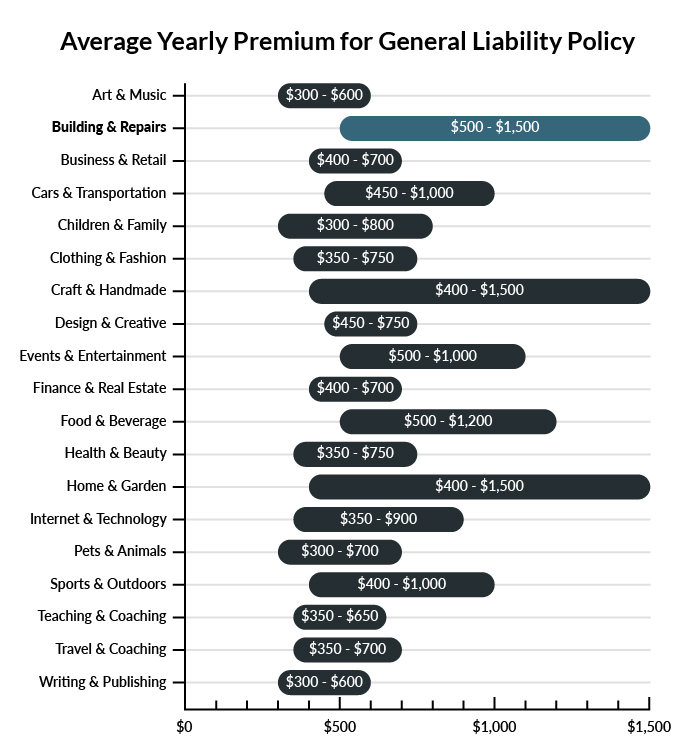Handyman Business Insurance
Getting insurance for your handyman business is essential.
Handyman businesses must protect themselves from various risks that come from operating a business. Insurance coverage can shield handyman companies from a wide range of hazards, such as property damage and bodily injury liability.
For example, you could damage a customer’s property while attempting to fix it, or a customer could trip over a power cord you’ve placed in their home for one of your tools.
We’ll help you find the most personalized and affordable coverage for your unique business.

Recommended: Next Insurance is dedicated to matching small businesses with the right policy at the best price.
Best Insurance for a Handyman Business
General liability insurance is — generally speaking — one of the most important insurance policies for handyman businesses.
Some of the risks general liability insurance covers are:
- Bodily injury
- Property damage
- Medical payments
- Legal defense and judgment
- Personal and advertising injury
While general liability insurance will protect your handyman company from a wide range of hazards, there are insurance policies especially designed for specific risks. Such specialized policies include:
- Cyber Liability Insurance: This type of insurance will protect you if someone steals your customers’ personal information online and you face a lawsuit.
- Business Interruption Insurance: If you ever need to close up shop for an extended length of time, business interruption insurance will replace your lost income.
- Commercial auto insurance: Any company that has vehicles that employees drive needs commercial auto insurance.
- Workers’ compensation insurance: This pays for employees’ medical bills if they get sick or injured at work.
When it’s time to buy insurance, you will need to choose between the following two types of insurers:
- Traditional brick-and-mortar insurers: Traditional insurers, like State Farm, have been in the market for years and so have established business models that are typically focused on selling policies through agents or brokers.
- Online insurers: Insurtechs like Zipari and Next sell insurance on their websites and charge less for the same quality and type of coverage. They’re also generally faster than traditional insurers. As such, we typically recommend online insurers for most small businesses.
Let’s Find the Coverage You Need
The best insurers design exactly the coverage you need at the most affordable price.
Cost of General Liability Insurance
On average, handyman businesses in America spend between $500 – $1,500 per year for $1 million in general liability coverage.
Compare the average cost of general liability insurance for a handyman business to other professional industries using the graph below.
Several factors will determine the price of your policy. These include your:
- Location
- Deductible
- Number of employees
- Per-occurrence limit
- General aggregate limit
You may be able to acquire general liability insurance at a discounted rate by purchasing it as part of a business owner’s policy (BOP) rather than as a standalone policy.
A BOP is a more comprehensive solution that includes multiple forms of coverage, such as business interruption and property insurance.

Find the Best Rate
Discover the best coverage at the lowest rate in our affordable business insurance review.
Common Situations That General Liability Insurance May Cover for a Handyman Business
Example 1: An employee drops a window while working in a customer’s home, shattering the window and damaging their new wood floors. General liability insurance would cover the cost to replace the window and floors.
Example 2: While meeting about an upcoming project, your client trips over a can of paint and breaks an arm. If you’re found liable, general liability insurance would cover her medical bills.
Example 3: Someone overhears you and your colleague talking negatively about a client and informs that client, who sues you for slander. General liability insurance would cover your legal expenses and any resulting payout to the client.
Other Types of Coverage Handyman Businesses Need
While general liability is the most important type of insurance to have, there are several other forms of coverage you should be aware of. Below are some of the most common types of coverage:
Home-Based Business Insurance
Since an office is unnecessary for this type of business, you may choose to operate out of your home. If your home suffers a loss or a client has an accident during a meeting there, you may find you’re underinsured or uninsured through your existing homeowners insurance policy. Home-based business insurance fills in those gaps, protecting against losses a standard homeowners policy excludes.
You can typically purchase home-based business insurance as a part of a business owners policy (BOP). For an additional premium, some homeowners insurance providers offer this coverage as a rider (extension of coverage).
Workers’ Compensation Insurance
If you have employees, you likely need this coverage because most states require businesses to carry workers’ compensation insurance for their part-time and full-time staff. This coverage protects your employees if they become injured at work or fall ill after a work-related accident. It not only covers an employee’s medical bills and lost wages if they need time to recover, but also any disability or death benefits stemming from a work-related accident.
While many states allow business owners to exclude themselves, consider including yourself in your policy if you’re directly involved in day-to-day business operations.
You can typically purchase workers’ compensation insurance as a standalone policy.
Commercial Auto Insurance
If you have an accident while traveling to and from client sites, your personal auto policy may exclude that loss. A separate commercial auto policy helps fill that coverage gap, and each state mandates the minimum levels of auto coverage for all vehicles that operate on public roadways. Most often, those minimums only offer basic protection, leaving you underinsured in the event of a loss so consider purchasing limits greater than those required by state law.
You can typically purchase commercial auto insurance as part of a business owners’ policy (BOP) or as a standalone policy.
Additional Steps To Protect Your Business
Although it’s easy (and essential) to invest in business insurance, it shouldn’t be your only defense.
Here are several things you can do to better protect your handyman business:
- Use legally robust contracts and other business documents. (We offer free templates for some of the most common legal forms.)
- Set up an LLC or corporation to protect your personal assets. (Visit our step-by-step guides to learn how to form an LLC or corporation in your state.)
- Stay up to date with business licensing.
- Maintain your corporate veil.
Handyman Business Insurance FAQ
Yes, absolutely. You will need to first get a quote from an online business insurance provider like Next Insurance. Next allows you to then purchase a policy immediately and your coverage will be active within 48 hours.
A typical business owner’s policy includes general liability, business interruption, and commercial property insurance. However, BOPs are often customizable, so your agent may recommend adding professional liability, commercial auto, or other types of coverage to your package depending on your company’s needs.
“Business insurance” is a generic term used to describe many different types of coverage a business may need. General liability insurance, on the other hand, is a specific type of coverage that business owners need to protect their assets.
Yes, and there are good reasons why business insurance is a must. Your handyman business will be exposed to various risks from the start, and thus you should have insurance before opening up shop.
In addition, state laws mandate the purchase of commercial auto insurance to cover company vehicles and workers’ compensation insurance to cover employees.
Not necessarily. Certain exceptions may be written directly into your handyman business insurance policy, and some perils may be entirely uninsurable.
Yes, an LLC is meant to create a legal barrier between your business and your personal assets and credit. If you haven’t formed an LLC yet, use our Form an LLC guide to get started.
An LLC doesn’t protect your business assets from lawsuits and liability– that’s where business insurance comes in. Business insurance helps protect your business from liability and risk.